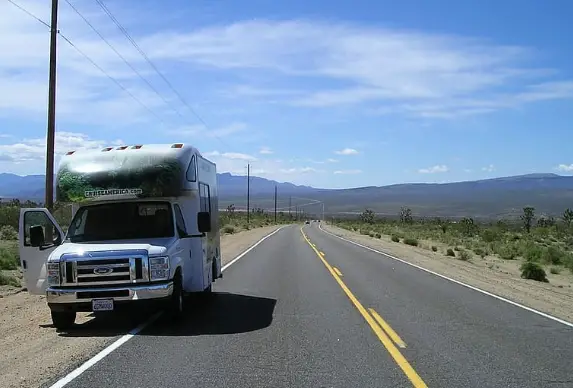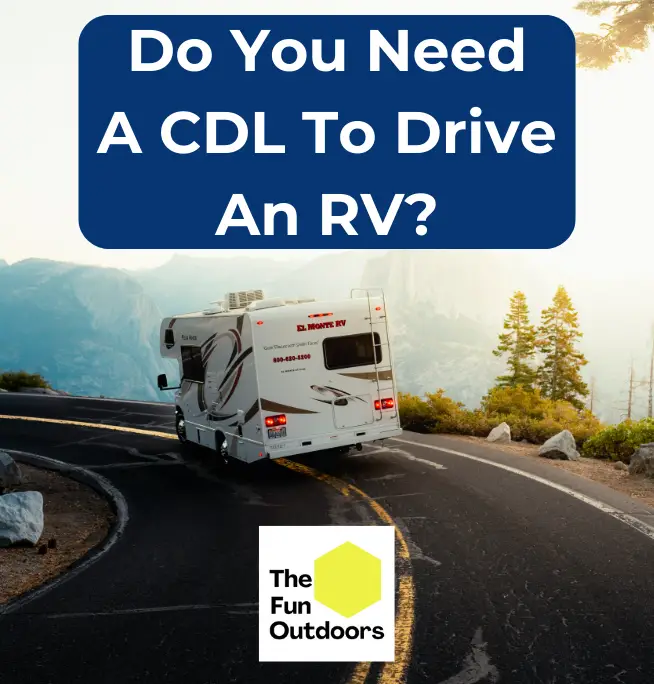There are many things to think about when considering owning or renting an RV. A common question most new RV owners ask is: do you need a CDL to drive an RV?
You do not need a CDL to drive an RV if your RV is under 26,000 pounds and less than 40 feet long. You do not need a CDL to drive a Class B RV or Class C RV in most states. AR, CA, CT, HI, KS, MI, NV, NM, NY, NC, SC, DC, WI, and WY are the only states that require a CDL to drive an RV.
We’ll go over everything you need to know about what’s needed for special licenses to drive an RV in this guide.
Do I Need A Special License Or CDL To Drive An RV?

When it comes to driving an RV, many people wonder if they need a special license or CDL. The answer to this question depends on the weight of the RV and the type of RV being driven.
In general, most states do not require a special license or CDL to drive an RV that weighs less than 26,000 pounds or towed vehicles under 10,000 pounds. This means that most non-commercial motorhomes and recreational vehicles can be driven with a regular driver’s license.
However, if the RV is a commercial vehicle, such as a bus, or if it weighs more than 26,000 pounds, a CDL may be required. Additionally, some states may have specific requirements for certain types of RVs, such as Class A motorhomes or Class C RVs.
It is important to note that while a CDL may not be required for most RVs, it is still important to have the proper training and experience before driving one. RVs can be large and difficult to maneuver, and it is important to know how to safely operate them on the road.
In summary, most non-commercial motorhomes and recreational vehicles can be driven with a regular driver’s license. However, commercial vehicles or RVs that weigh more than 26,000 pounds may require a CDL. It is important to check with your state’s DMV for specific requirements and to have proper training and experience before driving any type of RV.
Types Of RVs and Their License Requirements

Class A RVs
Class A RVs are the largest type of RVs and are often referred to as motorhomes. They are built on a commercial truck or bus chassis and can range in size from 21 to 45 feet in length. Class A RVs require a special license endorsement in some states, but they do not require a commercial driver’s license (CDL). The license endorsement required varies by state, but it usually depends on the weight of the RV.
In some states, a Class A CDL is required for RVs that weigh more than 26,000 pounds. However, in most states, a regular driver’s license or a non-commercial driver’s license is sufficient. It is important to check the license requirements in the state where the RV will be driven.
Class B RVs
Class B RVs, also known as camper vans, are smaller than Class A RVs and are built on a van chassis. They are usually between 16 and 22 feet in length and can be driven with a regular driver’s license in most states. However, some states require a Class B license endorsement for RVs that weigh more than 26,000 pounds.
Class C RVs
Class C RVs are built on a truck or van chassis and are larger than Class B RVs but smaller than Class A RVs. They are usually between 20 and 33 feet in length and can be driven with a regular driver’s license in most states. However, some states require a Class C license endorsement for RVs that weigh more than 26,000 pounds.
It is important to note that license requirements for RVs can vary by state and can depend on the weight of the RV and the type of license endorsement required. It is recommended to check the license requirements in the state where the RV will be driven before hitting the road.
In summary, Class A RVs are the largest and require a special license endorsement in some states, but they do not require a CDL. Class B and Class C RVs can be driven with a regular driver’s license in most states, but some states require a license endorsement for RVs that weigh more than 26,000 pounds.
States That Require A CDL (Commercial Driver’s License) To Drive An RV
Driving an RV can be an exciting adventure, but it’s essential to know the laws and regulations in your state. In most cases, you don’t need a CDL to drive an RV.
Note that if your driver’s license meets the requirements in the state where your RV is registered, you do not need to get a special license to operate your RV when traveling in another state or within Canada.
However, some states require you to obtain a CDL if your RV exceeds a particular weight limit. Here are the states that require a CDL to drive an RV:
Arkansas
In Arkansas, you need a CDL to drive an RV if it weighs over 26,000 pounds.
California
In California, you need a CDL if you’re towing more than 10,000 pounds.
Connecticut
In Connecticut, you need a CDL if your RV weighs over 26,000 pounds.
Hawaii
In Hawaii, you need a CDL if your RV weighs over 26,000 pounds.
Kansas
In Kansas, you need a CDL if your RV weighs over 26,000 pounds.
Michigan
In Michigan, you need a CDL if your RV weighs over 26,000 pounds.
Nevada
In Nevada, you need a CDL if your RV weighs over 26,000 pounds.
New Mexico
In New Mexico, you need a CDL if your RV weighs over 26,000 pounds.
New York
In New York, you need a CDL if your RV weighs over 26,000 pounds.
North Carolina
In North Carolina, you need a CDL if your RV weighs over 26,000 pounds.
South Carolina
In South Carolina, you need a CDL if your RV weighs over 26,000 pounds.
Washington DC
In Washington DC, you need a CDL if your RV weighs over 26,000 pounds.
Wisconsin
In Wisconsin, you need a CDL if your RV weighs over 45,000 pounds.
Wyoming
In Wyoming, you need a CDL if your RV weighs over 26,000 pounds.
It’s important to note that the weight limit varies from state to state, so it’s crucial to check with your state’s Department of Motor Vehicles before hitting the road. Additionally, if you plan to travel across state lines, you need to comply with the regulations of each state you drive through.
In conclusion, if you’re planning to drive an RV, it’s crucial to know the laws and regulations in your state. While most states don’t require a CDL to drive an RV, some do. So, it’s better to be safe than sorry and check with your state’s DMV to avoid any legal issues.
States That Require A Class B License To Drive An RV
In some states, drivers are required to have a Class B commercial driver’s license (CDL) to operate an RV. Here are some of the states that have this requirement:
California
In California, a Class B license is required for RVs that weigh over 26,000 pounds or are over 40 feet long. A Class A license is required for towing vehicles over 10,000 pounds.
Maryland
In Maryland, a Class B license is required for RVs that weigh over 26,000 pounds. This applies to both motorhomes and trailers.
Nevada
In Nevada, a Class B license is required for RVs that weigh over 26,000 pounds or are over 40 feet long. A Class A license is required for towing vehicles over 10,000 pounds.
North Carolina
In North Carolina, a Class B license is required for RVs that weigh over 26,000 pounds or are over 45 feet long. A Class A license is required for towing vehicles over 10,000 pounds.
Pennsylvania
In Pennsylvania, a Class B license is required for RVs that weigh over 26,000 pounds or are over 45 feet long. A Class A license is required for towing vehicles over 10,000 pounds.
Texas
In Texas, a Class B license is required for RVs that weigh over 26,000 pounds or are over 45 feet long. A Class A license is required for towing vehicles over 10,000 pounds.
Wyoming
In Wyoming, a Class B license is required for RVs that weigh over 26,000 pounds or are over 45 feet long. A Class A license is required for towing vehicles over 10,000 pounds.
It is important to note that these requirements can vary and change over time. It is recommended to check with the specific state’s Department of Motor Vehicles (DMV) for the most up-to-date information.
States That Require A Special Driver’s License Endorsement To Drive An RV
Michigan
In Michigan, a special driver’s license endorsement is required to operate an RV if it weighs more than 26,000 pounds or is longer than 45 feet. The endorsement is called a “Group A” designation and requires passing a written and driving test. The endorsement also permits the operation of vehicles such as fire trucks, buses, and other commercial vehicles.
Nevada
In Nevada, drivers must obtain a non-commercial Class B license to operate an RV that weighs more than 26,000 pounds or is longer than 40 feet. The license requires passing a written and driving test and meeting certain medical requirements. Drivers with a Class B license are also permitted to operate vehicles such as dump trucks, delivery trucks, and other commercial vehicles.
New York
In New York, a special driver’s license endorsement is required to operate an RV if it weighs more than 26,000 pounds or is longer than 40 feet. The endorsement is called a “Z” endorsement and requires passing a written and driving test. The endorsement also permits the operation of vehicles such as school buses, ambulances, and other commercial vehicles.
It is important to note that these requirements may change, and it is the responsibility of the driver to ensure they are operating their RV legally. It is recommended that drivers research the specific requirements of the state they plan to travel in and obtain the necessary endorsements or licenses before hitting the road.
States That Don’t Require A Special License To Drive An RV
Most states in the US do not require a special license to drive an RV. Unless the RV weighs over 26,000 pounds or the towed vehicle weighs over 10,000 pounds, a regular driver’s license is sufficient to operate an RV.
Here is a list of states that do not require a special license to drive an RV:
- Alabama
- Alaska
- Arizona
- Colorado
- Delaware
- Florida
- Georgia
- Idaho
- Illinois
- Indiana
- Iowa
- Kentucky
- Louisiana
- Maine
- Massachusetts
- Minnesota
- Mississippi
- Missouri
- Montana
- Nebraska
- New Hampshire
- New Jersey
- North Dakota
- Ohio
- Oklahoma
- Oregon
- Rhode Island
- South Dakota
- Tennessee
- Utah
- Vermont
- Virginia
- Washington
- West Virginia
It is important to note that some states may have additional requirements for driving an RV, such as age restrictions or specific driving tests. It is recommended to check with the local Department of Motor Vehicles (DMV) before driving an RV in a new state.
Overall, it is relatively easy to drive an RV in most states without a special license. As long as the RV is under the weight limit, a regular driver’s license is sufficient to operate it.
International RV License Requirements
If you are planning to take your RV on an international road trip, it is important to know the license requirements for the countries you will be visiting. Some countries may require a special license or permit to drive an RV, while others may recognize your existing license.
Driving An RV In Canada
If you are a US citizen, you do not need a special license to drive an RV in Canada. Your US driver’s license is valid for driving in Canada, as long as it is not expired or suspended. However, it is recommended that you carry an International Driving Permit (IDP) in addition to your driver’s license. An IDP is a translation of your license into multiple languages and can be helpful in case of language barriers or if you need to rent a vehicle.
If you are a Canadian citizen or permanent resident, you can drive an RV with a standard driver’s license as long as the vehicle’s weight does not exceed 11,000 kg (24,250 lbs). If the RV exceeds this weight limit, you will need to obtain a Class 1 driver’s license.
Driving An RV In Mexico
If you are driving an RV in Mexico, you will need to obtain a Temporary Import Permit (TIP) for your vehicle. This permit is required for all foreign vehicles entering Mexico and can be obtained at the border or online in advance. You will also need a valid driver’s license from your home country.
Mexico recognizes US and Canadian driver’s licenses, but it is recommended that you carry an IDP in addition to your license. It is important to note that the minimum age for driving in Mexico is 18 years old, and seat belts are mandatory for all passengers. Additionally, some states in Mexico have specific driving restrictions or regulations, so it is important to research the laws of the states you will be visiting.
Overall, when traveling internationally with an RV, it is important to research the license requirements for the countries you will be visiting and to carry all necessary documentation with you.
Regulations For Personal And Non-Commercial RV Use
In most states, a commercial driver’s license (CDL) is not required for personal and non-commercial RV use. However, regulations may vary depending on the state and the weight of the RV.
The following table shows the weight limits for non-commercial RV use in different states:
| State | Weight Limit |
| Alabama | No limit |
| Alaska | No limit |
| Arizona | No limit |
| Arkansas | 26,000 pounds |
| California | No limit |
| Colorado | No limit |
| Connecticut | 26,001 pounds |
| Delaware | No limit |
| Florida | No limit |
| Georgia | No limit |
| Hawaii | 26,001 pounds |
| Idaho | No limit |
| Illinois | No limit |
| Indiana | No limit |
| Iowa | No limit |
| Kansas | No limit |
| Kentucky | No limit |
| Louisiana | No limit |
| Maine | No limit |
| Maryland | No limit |
| Massachusetts | No limit |
| Michigan | No limit |
| Minnesota | No limit |
| Mississippi | No limit |
| Missouri | No limit |
| Montana | No limit |
| Nebraska | No limit |
| Nevada | No limit |
| New Hampshire | No limit |
| New Jersey | No limit |
| New Mexico | 26,001 pounds |
| New York | No limit |
| North Carolina | No limit |
| North Dakota | No limit |
| Ohio | No limit |
| Oklahoma | No limit |
| Oregon | No limit |
| Pennsylvania | No limit |
| Rhode Island | No limit |
| South Carolina | No limit |
| South Dakota | No limit |
| Tennessee | No limit |
| Texas | No limit |
| Utah | No limit |
| Vermont | No limit |
| Virginia | No limit |
| Washington | 26,001 pounds |
| West Virginia | No limit |
| Wisconsin | 26,001 pounds |
| Wyoming | No limit |
It is important to note that these weight limits are subject to change, and it is recommended to check with the Department of Motor Vehicles (DMV) in your state for the most up-to-date regulations.
In addition to weight limits, some states may require a special endorsement or non-commercial driver’s license for RVs over a certain weight or length. It is important to check with the DMV in your state to determine if any additional requirements apply.
How Do I Apply For A Special RV Driver’s License?
You can apply for a CDL or special driver’s license endorsement through your state’s DMV office. Each state’s application process varies, so check with your local DMV office to ensure you have everything you need.

